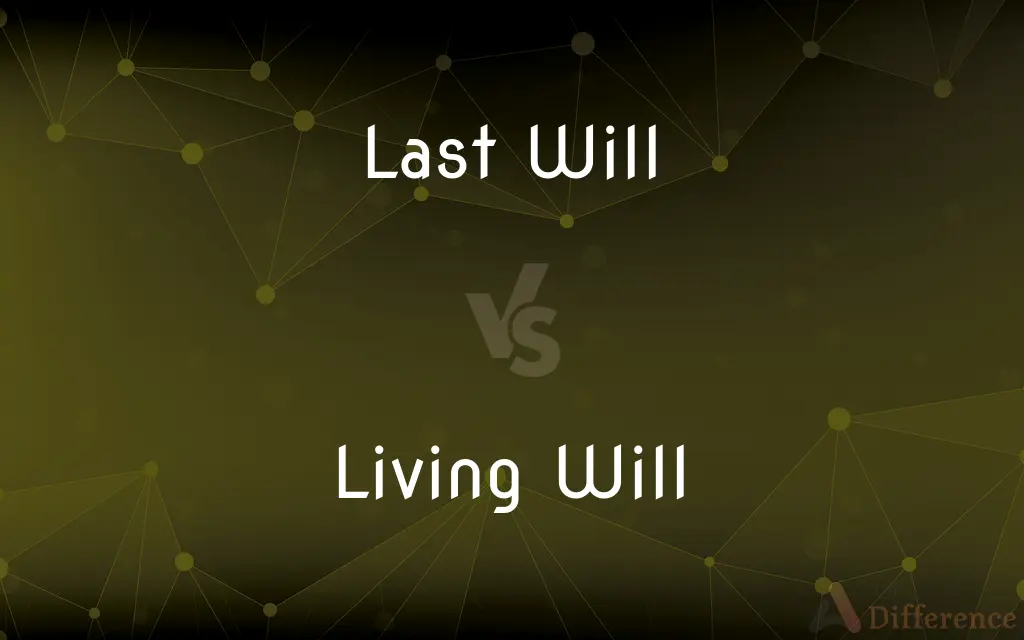Last Will vs. Living Will — What's the Difference?
By Maham Liaqat & Urooj Arif — Published on September 19, 2024
A Last Will dictates the distribution of a person's assets after death, while a Living Will outlines healthcare wishes in case of incapacitation.

Difference Between Last Will and Living Will
Table of Contents
ADVERTISEMENT
Key Differences
A Last Will and Testament, commonly referred to as a Last Will, is a legal document that expresses an individual's wishes regarding the distribution of their assets and the care of any minor children after their death. It becomes effective only upon the individual's death, detailing how their properties, possessions, and investments should be handled and allocated to heirs or beneficiaries.
A Living Will, on the other hand is a document that specifies an individual's preferences for medical treatment in situations where they are unable to communicate their decisions due to illness or incapacity. This can include directions on the use of life-sustaining measures, pain management, and other healthcare treatments. Unlike a Last Will, a Living Will takes effect while the individual is still alive but incapacitated.
The primary difference between these documents lies in their purpose and the time they become effective. A Last Will focuses on estate and asset distribution after death, requiring a legal process known as probate to validate and execute the will's directives. A Living Will, however, is concerned with healthcare decisions and quality of life issues during the individual's lifetime, especially in scenarios that involve terminal illness or severe injury, and does not go through probate.
Another key distinction is in the execution and legal requirements for these documents. While both require the individual to be of sound mind when creating them, a Last Will often needs to be witnessed and sometimes notarized, depending on state laws. A Living Will also typically requires witnesses and may need to comply with specific state regulations regarding healthcare directives.
Both a Last Will and a Living Will serve critical roles in personal estate and healthcare planning. They ensure an individual's wishes are respected and followed, whether after death or during a period of incapacity, providing peace of mind to the person and their loved ones.
ADVERTISEMENT
Comparison Chart
Purpose
Distribution of assets post-death
Healthcare decisions during incapacitation
Effective Time
After death
During life, upon incapacitation
Primary Focus
Estate, assets, guardianship of minors
Medical treatment preferences
Legal Process
Requires probate to execute
Directly guides healthcare providers, no probate
Legal Requirements
Must be of sound mind, witnessed, sometimes notarized
Must be of sound mind, often requires witnesses, specific state compliance
Compare with Definitions
Last Will
A legal document detailing asset distribution and care of minors after one's death.
Her Last Will ensured her children's guardianship and the fair distribution of her estate.
Living Will
Activates when the individual cannot make healthcare decisions.
After the accident, her Living Will guided her medical care.
Last Will
Becomes effective only after death, guiding estate division.
His Last Will outlined a detailed plan for distributing his assets among family members.
Living Will
Directs healthcare providers, avoiding family disputes.
Thanks to his Living Will, there was no disagreement among family members about his treatment.
Last Will
Essential for preventing state default inheritance laws from applying.
Without a Last Will, his assets would be divided according to state laws, not his wishes.
Living Will
A document specifying medical treatment preferences in case of incapacitation.
His Living Will stated his wish not to be kept on life support in a vegetative state.
Last Will
Requires a probate process to validate and enforce.
The estate was settled according to his Last Will, following a smooth probate process.
Living Will
Outlines wishes regarding life-sustaining procedures and pain management.
The Living Will clarified her choices for end-of-life care, including pain relief preferences.
Last Will
Can appoint an executor to manage estate affairs.
She was named executor in her aunt's Last Will, responsible for overseeing the estate's distribution.
Living Will
Helps to ensure that healthcare decisions reflect the person's values and desires.
Her Living Will ensured her healthcare aligned with her beliefs about quality of life.
Common Curiosities
Can a Last Will and a Living Will be combined into one document?
No, they serve different purposes and are effective at different times; they should be created as separate documents.
Is a Living Will the same as a healthcare power of attorney?
No, a Living Will outlines your healthcare wishes, while a healthcare power of attorney appoints someone to make healthcare decisions on your behalf.
Do all states recognize Living Wills?
Yes, all states recognize Living Wills, but the specific requirements and forms may vary from state to state.
Do I need a lawyer to create a Last Will or Living Will?
While not strictly necessary, consulting a lawyer can ensure the documents comply with state laws and fully capture your wishes.
What happens if I die without a Last Will?
If you die intestate (without a Last Will), your assets will be distributed according to your state's intestacy laws, which may not align with your wishes.
Does a Living Will apply in cases of temporary incapacity?
Yes, a Living Will can guide medical decisions during periods of temporary incapacity from which recovery is expected.
Can a Living Will dictate what happens to my assets?
No, a Living Will is solely for healthcare decisions; asset distribution is the domain of a Last Will.
Are there any costs associated with creating a Last Will or Living Will?
Costs can vary depending on whether you consult a lawyer or use an online service. Drafting documents yourself can minimize costs, but professional advice ensures legality and completeness.
How often should I review and possibly update my Last Will and Living Will?
It's wise to review these documents every few years or after significant life events such as marriage, divorce, the birth of a child, or a major change in assets or health.
What happens if I have a Last Will but not a Living Will?
Without a Living Will, decisions about your healthcare in situations of incapacitation might be made by family members or medical providers, possibly leading to choices that don't align with your preferences.
What if I only have a Living Will and become incapacitated?
A Living Will guides your medical treatment in such scenarios, but without a Last Will, your assets will be distributed according to state laws after your death.
Can a Last Will cover my digital assets?
Yes, a Last Will can and should include instructions for the handling of digital assets, including social media accounts, digital currencies, and online accounts.
Can I change my Last Will or Living Will?
Yes, both documents can be updated as your wishes or circumstances change, but updates must follow legal protocols to be valid.
What's the difference between a Living Will and a DNR (Do Not Resuscitate) order?
A Living Will provides broad instructions for healthcare if you're incapacitated, while a DNR is a specific medical order not to perform CPR if your heart stops or you stop breathing.
How do I ensure my Last Will and Living Will are followed?
Inform your family and healthcare providers about these documents, keep them in accessible locations, and consider providing copies to relevant parties such as your executor, healthcare proxy, and attorney.
Share Your Discovery

Previous Comparison
Romper vs. Jumpsuit
Next Comparison
Southern Blotting vs. Northern BlottingAuthor Spotlight
Written by
Maham LiaqatCo-written by
Urooj ArifUrooj is a skilled content writer at Ask Difference, known for her exceptional ability to simplify complex topics into engaging and informative content. With a passion for research and a flair for clear, concise writing, she consistently delivers articles that resonate with our diverse audience.













































